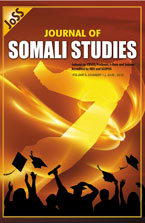
 editor@adonis-abbey.com
editor@adonis-abbey.com ![]() UK: 0207 795 8187 / Nigeria:+234 705 807 8841
UK: 0207 795 8187 / Nigeria:+234 705 807 8841
Journal of Somali studies (JoSS) Volume 6, Numbers 1, June 2019
Table of Contents :
The “Historic Sins” of Colonialism in Somalia https://doi.org/10.31920/2056-5682/2019/v6n1a1
Ali Mumin Ahad9
Somalia’s Struggle to Integrate Traditional and Modern Governance Systems: The 4.5 Formula and the 2012 Provisional Constitution . https://doi.org/10.31920/2056-5682/2019/v6n1a2
Nasteha Mohamud Ahmed41
My purpose in this article is to assess the impact of Somalia‘s 4.5 power sharing formula on the consolidation of national post-conflict governance in the hands of a representative Somali body. Per the Arta Peace Agreement, seats in parliament are awarded to the four major clans, which also dominate the election process. This has led to the perpetuation of many of the same social (clan) dynamics that lead to conflict in the past. Even though the 4.5 formula is not part of the Somali constitution adopted in 2012, the 2017 presidential elections were primarily derived from the formula. Although the goal was to move towards a one-man one-vote system, the use of the 4.5 formula in the 2017 elections signifies a struggle which mostly stems from the lack of physical security or resistance to limit the influence clan has in the election process. This article will argue that clan influence is likely to remain a challenge for Somalia‘s transition to democracy until a civilian-based voting system is put into place.
Hybridity and Fixity: Modes of Resistance in Safi Abdi’s Offspring of Paradise and A Mighty Collision of Two Worlds. https://doi.org/10.31920/2056-5682/2019/v6n1a3
Andrew Nyongesa,Justus Makokha and Kaigai Kimani 71
Perceptions of Academic Administrators and Policymakers on ESL/EFL Education. https://doi.org/10.31920/2056-5682/2019/v6n1a4
Mohamed A. Eno, Ali M. Ahad and Abdifatah Shafat93
There is credible evidence in the literature on the prominence of English language as the most popular global medium. The manifold of roles it assumes in international trade, and its dominance in the global financial and business transactions, testify to the dominance of the British colonial legacy across the universe. Moreover, the enduring nature of the imperial culture, particularly its influence in the world academic arena, its ubiquity in the sphere of global cultural and commercial exchanges as well as in the advancement of science and technology worldwide provides testimony to the potential of the sway which Britain‘s colonial expedition and exploitation has impacted on the entire world, directly and indirectly. To posit it more bluntly, the legacy of the cultural tension is nowhere more evident than in the newly independent nations which, after liberation and departure of colonial rule, could not pursue an indigenously- focused language policy and planning (LPP) strategy alternative to the colonial medium. That is why immediately after decolonization language policy and language planning (LPLP) became among the most debated postcolonial impasses in sub-Saharan Africa. With the exception of very few, most sub- Saharan countries are still staggering with the problem-maintaining the language of the former colonial ruler in the academia and national bureaucracy-with no unilateral solution to rid of it. In light of such reality, this study aims to augment the scant studies previously carried out on ESL/EFL and English language education in Somalia. It examines the perceptions of educational administrators and policymakers on matters related to language policy and education in the learning institutions. In specific terms, the current study enriches earlier studies on the perceptions of students on learning ESL/EFL (Eno 2017), ESL/EFL motivation (Eno et al. 2018) and a later essay on teachers‘ perceptions of the challenges of ESL/EFL education (Eno 2018).
Africa’s First Democrats: Somalia’s Aden A. Osman and Abdirazak H. Hussein. Abdi Ismail Samatar https://doi.org/10.31920/2056-5682/2019/v6n1a5
Ahmed Hassan121
[abstract]
| Annual Subscription Rate |
| Individual Subscriptions |



